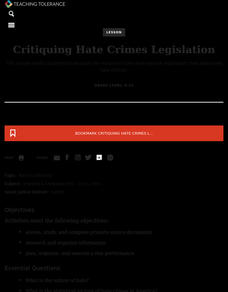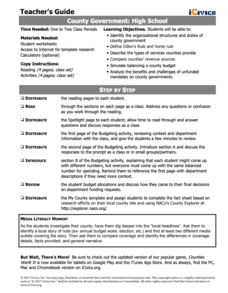School Improvement in Maryland
Political Systems: Advantages and Disadvantages
Every political system has advantages and disadvantages. To gain an understanding of these differences, groups investigate the political system of another country—oligarchy, monarchy, dictatorship, parliamentary—and prepare a...
Constitutional Rights Foundation
Winner-Take-All: The Two-Party System
Two's company, three's a crowd. High school historians learn about the Electoral College, a two-party, winner-take-all voting system in the United States. The lesson explains the pros and cons of the two-party system, roadblocks for...
School Improvement in Maryland
Types of Economic Systems
As an introduction to economics, government classes investigate different types of economic systems (traditional, command, market or capitalist, mixed) to determine answers to basic question about how goods are produced.
Savvas Learning
Political Parties
What is a political party, and what major parties exist in American politics today? How did the party system develop in American history, and how are parties organized? These questions and many other details regarding the political party...
Encyclopedia Britannica
Beyond a Two-Party System
Young political scientists go beyond the two-party system and research third-party candidates running in the 2020 US Presidential election. Groups present background information about the candidate, the party's platform points, and a...
American Documentary
Religion in Culture & Politics: Women’s empowerment in Syria
What defines a woman as empowered, and how does this definition compare to the ideas and actions of a group of Muslim women in Syria? After watching a series of video clips from a documentary film about a school for girls in Damascus,...
K20 LEARN
Ancient Philosophy: Greeks or Romans?
While often not recognized, the ideas of ancient Greek and Roman philosophers still echo today. Using a series of videos and graphic organizers, individuals explore how ancient Greeks and Romans have influenced current Western political...
Constitutional Rights Foundation
The Troubled Elections of 1796 and 1800
Congress does more than create new laws. Political scientists delve into the elections of 1796 and 1800 to understand how political parties, the Electoral College, and personal agendas affected the election process. The resource also...
Thomas Jefferson Foundation
Personal Morals vs. Political Moves
Was Thomas Jefferson a hypocrite? That is the question facing class members as they examine excerpts from documents that relate to Jefferson's beliefs about slaves and slavery.
iCivics
Municipal Government: High School
Municipal government takes on many roles, not just the ones we are used to hearing about such as Parks and Recreation. Scholars delve into the topic to get a grasp on how the government system functions. They participate in readings,...
School Improvement in Maryland
Dividing the Powers of Government
Who does what? To develop an understanding of the balance of power between the US federal and state governments, class members research responsibilities in terms of legal systems, security issues, economic activities, lawmaking, and...
College Board
Civic Knowledge and Action in AP U.S. Government and Politics
Vote, it's your civic duty! The high school lesson focuses on voter turnout and civic participation with a series of activities. Young scholars analyze data to discover voter turnout trends, complete worksheets, and participate in group...
Carolina K-12
The Electoral College
Is the Electoral College the best method of electing the president of the United States? Your young historians will write a persuasive essay discussing the historical perspective of the college, pros and cons, and a final argument for or...
Teaching Tolerance
Critiquing Hate Crimes Legislation
The high school instructional activity explores what hate crimes are and how the government has responded to those crimes. Academics read legislation, analyze political cartoons, and complete hands-on-activities to understand what...
School Improvement in Maryland
Evaluating Political Advertisements
How do interest groups try to influence elections? As part of their study of the election process, groups view 30-second advertisements produced by advocacy groups and use the provided worksheet to evaluate these ads. They then craft...
Judicial Branch of California
The Power of the Press: The First Amendment
Was what happened in 1886 at the Haymarket riot a crime or a case of xenophobia? Using political cartoons from the time, young historians consider the role the media played in anti-labor sentiment during the time and how that influenced...
Constitutional Rights Foundation
Elections, Money, and the First Amendment
Those who spend the most, win. Academics read informational text, participate in group discussion, and defend campaign reforms to understand the correlation between money, the First Amendment, and election results. The resource explains...
Delegation of the European Union to the United States
Structure of Government within the EU
The political system of the European Union is historically unique and has been constantly evolving. To better understand the structure of the EU, class members compare the EU's branches to those of the United States Federal Government.
Teaching Tolerance
The War on Drugs—Mechanisms and Effects
The war on drugs doesn't have definite results. An interesting instructional activity examines the social, political, and economic effect of the war on drugs. Academics learn how the war on drugs has led to mass incarcerations and...
Children’s Hospital of Philadelphia
Case Study: The 1918 Influenza Pandemic – Factors Beyond the Biological that Influence the Spread of Disease
A very timely lesson looks at the social and political factors that affect the spread of disease. Using the 1918 Influenza Pandemic as a case study, pupils research factors that influenced the spread of the disease, including the role of...
Judicial Learning Center
The Judge and the Jury: Trial by Jury
Why is it so important to have a trial by jury in the American judicial system? This right is one of the hallmarks of American democracy, but it also comes with the responsibility of serving on a jury if called. Young legal scholars...
School Improvement in Maryland
Court Proceedings Civil Cases
What's the difference between civil and criminal law? How do the court proceedings differ in these two types of trials? How do the standards of proof differ? Why do these differences exist? As part of their examination of the US court...
Facing History and Ourselves
Reflection and Action for Civic Participation
Slacktivist or activist? Bystander or upstander? Positive social change requires involvement and commitment. After reading a series of articles about young people who chose to get involved, scholars examine a framework that helps peers...
iCivics
County Government: High School
Balancing a budget—the bane of many people's existence! Yet, its' something that must be done, especially in government systems. The resource, fourth in a seven-part series exploring local government, focuses on various exercises that...
Other popular searches
- Comparing Political Systems
- Modern Political Systems
- Political Systems Comparison
- Type of Political Systems
- Political Systems Role Play
- Political Beliefs Spectrum
- Political Systems Govt
- Political Systems Dynasties
- Political Systems Simulation

























